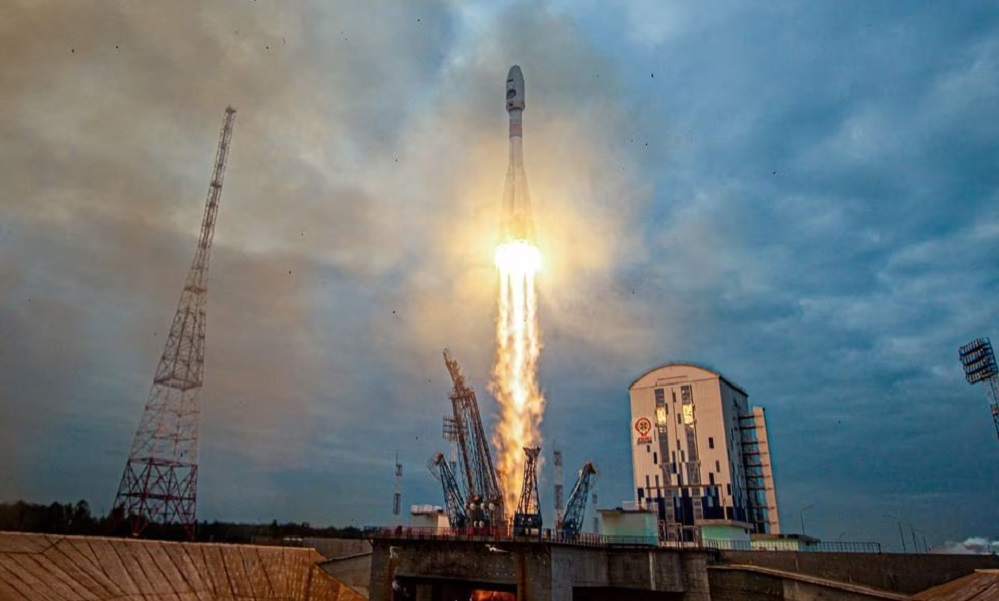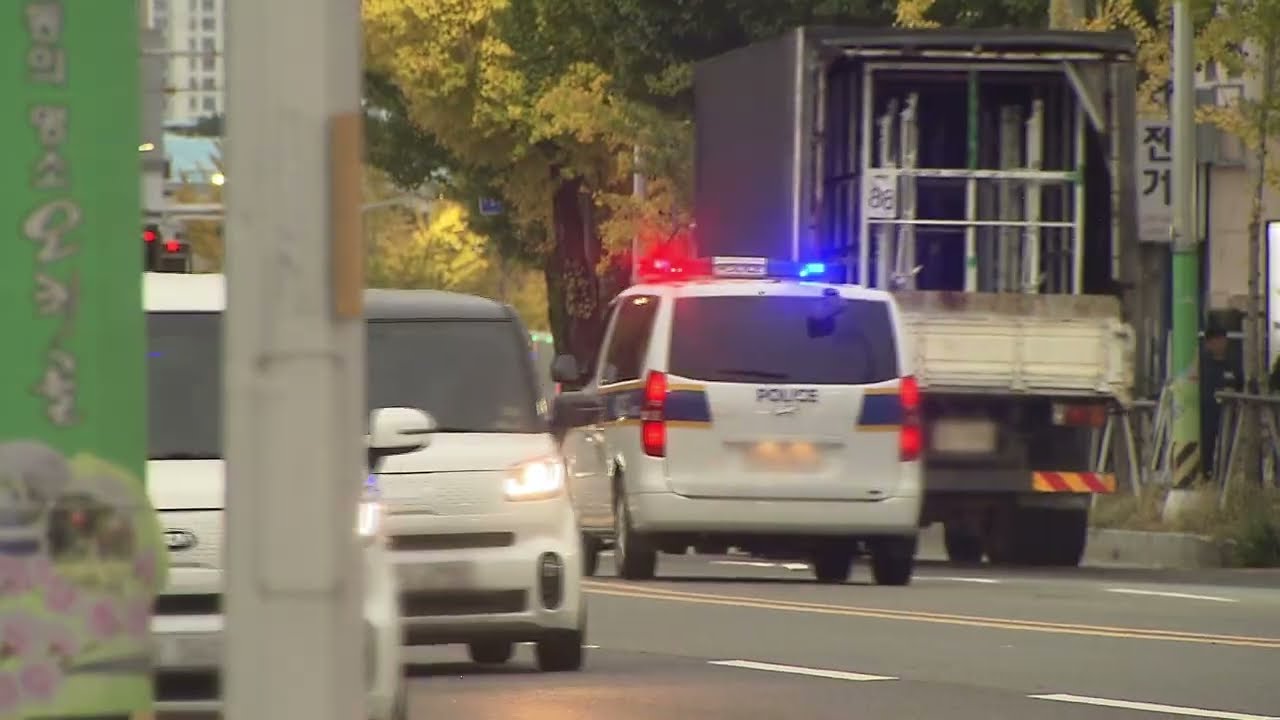Science & Technology
Russia’s first lunar mission in 47 years smashes into the moon in failure

Russia's first moon mission in 47 years failed when its Luna-25 space craft spun out of control and crashed into the moon after a problem preparing for pre-landing orbit, underscoring the post-Soviet decline of a once mighty space programme.
Russia's state space corporation, Roskosmos, said it had lost contact with the craft at 11:57 a.m. on Saturday after a problem as the craft was shunted into pre-landing orbit. A soft landing had been planned for Monday.
"The apparatus moved into an unpredictable orbit and ceased to exist as a result of a collision with the surface of the Moon," Roskosmos said in a statement.
It said a special interdepartmental commission had been formed to investigate the reasons behind the loss of the Luna-25 craft, whose mission had raised hopes in Moscow that Russia was returning to the big power moon race.
The failure underscored the decline of Russia's space power since the glory days of Cold War competition when Moscow was the first to launch a satellite to orbit the Earth - Sputnik 1, in 1957 - and Soviet cosmonaut Yuri Gagarin became the first man to travel into space in 1961.
It also comes as Russia's $2 trillion economy faces its biggest external challenge for decades: the pressure of both Western sanctions and fighting the biggest land war in Europe since World War Two.
Russia had not attempted a moon mission since Luna-24 in 1976, when Communist leader Leonid Brezhnev ruled the Kremlin.
Russian officials had hoped that the Luna-25 mission would show Russia can compete with the superpowers in space despite its post-Soviet decline and the vast cost of the Ukraine war.
More than a decade ago, the failure of the 2011 Fobos-Grunt mission to one of the moons of Mars underscored the challenges facing Russia's space programme: it could not even exit the earth's orbit and fell back to earth, smashing into the Pacific Ocean in 2012.
Eventually, in the early 2010s, Russia settled upon the idea of the Luna-25 mission to the south pole of the moon. Luna-25 did manage to exit the earth's orbit.
But its failure means that Russia may not be the first to sample the frozen water which scientists believe the south pole of the moon holds.
Science & Technology
Australia’s under-16 social media ban sparks anger and relief

Australians reacted on Friday with a mixture of anger and relief to a social media ban on children under 16 that the government says is world-leading, but which tech giants like TikTok argue could push young people to "darker corners of the internet".
Australia approved the social media ban for children late on Thursday after an emotive debate that has gripped the nation, setting a benchmark for jurisdictions around the world with one of the toughest regulations targeting Big Tech, Reuters reported.
The law forces tech giants from Instagram and Facebook owner Meta Platforms to TikTok to stop minors from logging in or face fines of up to A$49.5 million ($32 million). A trial of enforcement methods will start in January, with the ban to take effect in a year.
"Platforms now have a social responsibility to ensure the safety of our kids is a priority for them," Australian Prime Minister Anthony Albanese said on Friday
"We're making sure that mums and dads can have that different conversation today and in future days."
Announcing the details of the ban earlier this month, Albanese cited the risks to physical and mental health of children from excessive social media use, in particular the risks to girls from harmful depictions of body image, and misogynist content aimed at boys.
In Sydney on Friday, reaction to the ban was mixed.
"I think that's a great idea, because I found that the social media for kids (is) not really appropriate, sometimes they can look at something they shouldn't," said Sydney resident Francesca Sambas.
Others were more scathing.
"I'm feeling very angry, I feel that this government has taken democracy and thrown it out the window," said 58-year-old Shon Klose.
"How could they possibly make up these rules and these laws and push it upon the people?"
Children, meanwhile, said they would try to find a way around the ban.
"I feel like I still will use it, just secretly get in," said 11-year-old Emma Wakefield.
WORLD FIRST
Countries including France and some U.S. states have passed laws to restrict access for minors without a parent's permission, but the Australian ban is absolute. A full under-14s ban in Florida is being challenged in court on free speech grounds.
Albanese's Labor party won crucial support from the opposition conservatives for the bill that was fast-tracked through the country's parliament as part of 31 bills pushed through in a chaotic final day of parliament for the year.
The government has said enough notice was given as it first flagged the ban after a parliamentary inquiry earlier this year that heard testimony from parents of children who had self-harmed due to cyber bullying.
But it was criticised by social media firms and some lawmakers who say the bill has lacked proper scrutiny.
A spokesperson for TikTok, which is hugely popular with teen users, said on Friday the process had been rushed and risked putting children into greater danger.
"We're disappointed the Australian government has ignored the advice of the many mental health, online safety, and youth advocacy experts who have strongly opposed the ban," the spokesperson said.
Albanese said on Friday passing the bill before the age verification trial has been completed was the correct approach.
"We've got your back is our message to Australian parents," Albanese said.
"We don't argue that its implementation will be perfect, just like the alcohol ban for under 18s doesn't mean that someone under 18 never has access, but we know that it's the right thing to do."
The ban could strain Australia's relationship with key ally the United States, where X owner Elon Musk, a central figure in the administration of president-elect Donald Trump, said in a post this month it seemed a "backdoor way to control access to the Internet by all Australians".
It also builds on an existing mood of antagonism between Australia and mostly US-domiciled tech giants. Australia was the first country to make social media platforms pay media outlets royalties for sharing their content and now plans to threaten them with fines for failing to stamp out scams.
Science & Technology
South Korea authorities launch probe after three die in Hyundai car test
The Ulsan plant is Hyundai’s biggest manufacturing facility, with its own port and an annual production capacity of 1.4 million vehicles

South Korean authorities launched an investigation on Tuesday after three people died during a car test at a Hyundai Motor plant in the city of Ulsan, police told Reuters.
The two Hyundai researchers and one Hyundai contractor were found unconscious in a car at around 3:00 p.m. while they were testing it in a "chamber," according to Hyundai's labour union.
South Korean media reports said the three had suffocated.
A police officer in Ulsan said the police and the labour ministry were investigating the incident, including its cause.
A fire department official told Reuters that it first received a report at 3:17 pm that the accident happened at Hyundai's No.4 factory.
"Hyundai Motor Company is deeply saddened by the incident that occurred at our plant in Ulsan, South Korea," Hyundai said in a statement, saying it would "cooperate fully with all relevant authorities to determine the cause of this incident."
The Ulsan plant is Hyundai's biggest manufacturing facility, with its own port and an annual production capacity of 1.4 million vehicles, including exports of 1.1 million units.
In November last year, Hyundai Motor broke ground on a 2 trillion won ($1.44 billion) plant in Ulsan dedicated to making electric vehicles in South Korea, as the automaker accelerated a shift away from petrol-powered cars.
[embed]https://youtu.be/KrLKCrpLALU[/embed]
Science & Technology
Russia fines Google more than the world’s total GDP over YouTube bans

Russia has fined Google $2.5 decillion after the US tech giant took action against pro-Kremlin TV channels on YouTube following Moscow’s invasion of Ukraine.
Russia imposed a daily fine four years ago - a fine that has since swelled to an unprecedented level - ($20,000,000,000,000,000,000,000,000,000,000,000 - a 33-digit figure).
To put this into perspective, global GDP reaches an estimated $110 thousand billion (12-digit figure), according to the IMF.
Speaking to Russia’s TASS news agency, one expert, Roman Yankovsky from the HSE Institute of Education, said Google “clearly will not pay this penalty, and the Russian Federation will not be able to recover this money from the company."
Euronews reported that a short calculation shows that he is right.
Google's holding company, Alphabet, has a market capitalisation of slightly more than $2 trillion. Even with earnings of $80.54 billion from the last quarter, the tech giant doesn’t seem to be able to afford to pay the fine.
Google first barred pro-Moscow channel Tsargrad TV, which is owned by oligarch Konstantin Malofeev, four years ago.
At the time, Google was fined a daily penalty of 100,000 roubles and warned that amount would double every 24 hours if it went unpaid.
The original fine has been compounded by further penalties after Google eventually blocked a total of 17 Russian TV channels as a result of international sanctions, The Telegraph reported.
The tech giant now owes a staggering $2.5 decillion.
-

 Sport5 days ago
Sport5 days agoLanka T10: All three matches abandoned due to rain
-

 Latest News5 days ago
Latest News5 days agoIndia hoping to import coal and marble from Afghanistan
-

 Sport4 days ago
Sport4 days agoZimbabwe’s opening ODI against Afghanistan abandoned
-

 Latest News5 days ago
Latest News5 days agoFuel prices rise in Herat as winter approaches
-

 Latest News5 days ago
Latest News5 days agoJapan announces $27.5 million aid package to Afghanistan
-

 Latest News3 days ago
Latest News3 days agoTwo horror accidents on Kabul-Kandahar highway leave 52 dead
-

 Latest News1 day ago
Latest News1 day agoAfghan men must stand with women to support viable future of country: US envoy
-

 World3 days ago
World3 days agoNorth Korean troops suffer 100 deaths, struggling in drone warfare, South Korea says
























